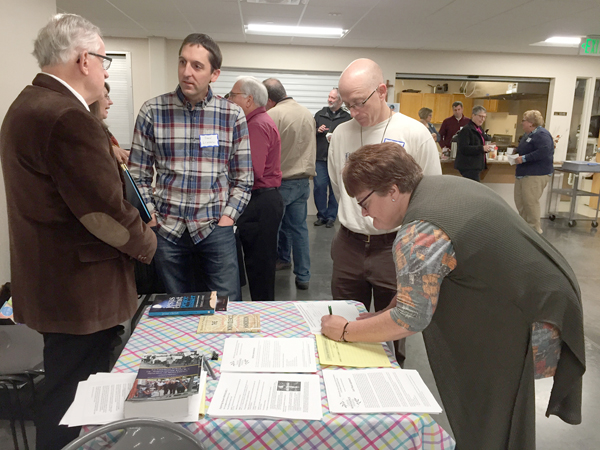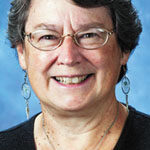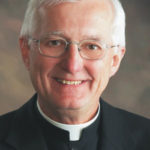
Participants at the diocesan Social Action Saturday conference learned about strategies for nonviolence and stewardship of the earth. The event, held Oct. 27 at St. Thomas More Parish in Coralville, drew about 40 people from various parishes.
By Barb Arland-Fye
The Catholic Messenger
CORALVILLE — Social Action commission members from parishes in the Davenport Diocese gained insights to advance their efforts on timely issues during Social Action Saturday. Some 40 attendees at the Oct. 27 event listened to presentations on the Catholic Nonviolence Initiative and on Climate Change. The latter presentation framed the issue within the context of Pope Francis’ encyclical “Laudato Si,” subtitled, “On care for our common home.”
Sister Jan Cebula, OSF, president of the Sisters of St. Francis of Clinton, teamed up with Tom Streveler of Jesus Christ, Prince of Peace Parish in Clinton for the interactive presentation on the Catholic Nonviolence Initiative (CNI). Sr. Cebula provided background about the CNI, developed by Pax Christi International. The CNI affirms the vision and practice of active nonviolence at the heart of the Catholic Church and commits to the healing and reconciling of both people and the planet. Sr. Cebula also encouraged attendees to sign the CNI “Appeal to the Catholic Church to recommit to the centrality of Gospel nonviolence” (https://nonviolencejustpeace.net).
The presenters wove questions for small-group sharing within the nonviolence presentation. “Looking at the world today, think of something that breaks your heart,” Sr. Cebula said. She and her audience were unaware of a mass shooting taking place at that moment in a Jewish synagogue in Pittsburgh. Eleven people died and six people were injured in what is being described as a hate crime. Diocesan Social Action Director Kent Ferris, fighting back tears, broke the news to the gathering later during the conference.
Sr. Cebula said that Catholics are called to respond to what has become normalized systemic violence by recovering the centrality of nonviolence, working toward healing and reconciling of both people and the planet. Nonviolence involves positive, creative engagement and is a powerful force for social change. It is a way of life and a means of building a global community, she said.
Look to Jesus, the presenters said, on how to be a positive force for healing, restoring community, asserting human dignity, on challenging the status quo and confronting the powerful. Accept suffering, they said, but don’t inflict it. “Where have you seen nonviolence in action,” they asked the attendees. Consider the way in which a meeting is conducted or the ability to deescalate a tense situation, for example. Nonviolence begins at home, and with neighbors. It can include the entertainment that people engage in or the games they play — cooperative vs. competitive.
Tools of active nonviolence include mediation, trauma healing, restorative justice (re-establishing right relationships), nonviolent resistance and unarmed civil protection, among things. Sr. Cebula also introduced the concept of Just Peace, which focuses on actions that transform conflict, break the cycle of violence and build more sustainable peace. “It’s not just resolving conflict, but transforming it,” she said.
A gathering/forum on the CNI will be held in Rome in 2019, three years after the first such gathering. The ultimate goal is to inspire Pope Francis to write an encyclical on nonviolence. “It will need a lot of on the ground support, Sr. Cebula said.
Thom Krystofiak was one of three presenters on Climate Change, described in a PowerPoint as “one of the greatest acts of violence we have … perpetrated on ourselves.” He identified Pope Francis and Laudato Si as “the ultimate inspiration for us.” He and co-presenters Jonas Magram and Mary Tarnoff are part of Climate Action Southeast Iowa.
They shared information about a new, landmark report from the International Panel on Climate Change (ICCP) that speaks with urgency about the need to respond to an issue that is creating misery, especially for vulnerable, impoverished peoples. (See Father Bud Grant’s report on the Opinion page.)
The presenters also shared some solutions to helping solve the crisis, such as solar energy, electric cars, wind power, reduced use of fossil fuels, driving less and riding bicycles instead. Write letters to the editors, talk to neighbors about the issue. Encourage governments to use renewable resources and to provide strong incentives for their use and to institute a carbon tax. Divest from fossil fuel stocks. Support intense research and development. “We have a crisis to solve and we can’t do without a private, public partnership,” Magram said.
St. Thomas More’s “Green Team” set a visible example of striving to be good stewards of God’s Creation, serving lunch with real plates, silverware and coffee mugs and providing bins for compostable leftovers, recyclable materials and trash.
The conference concluded with the parishes’ Social Action commission members sharing information about their activities. The next Social Action Saturday will be held Jan. 26.











